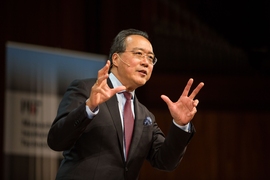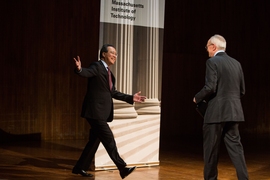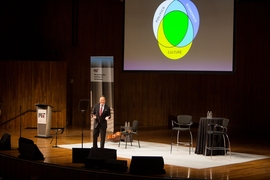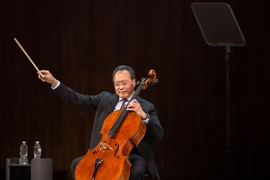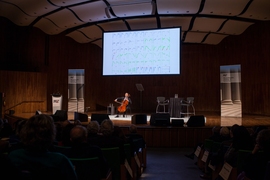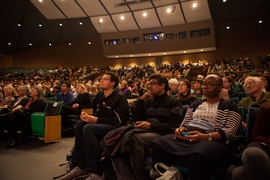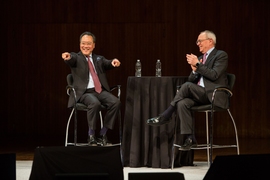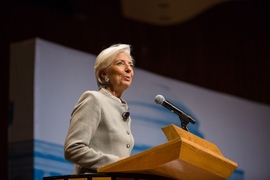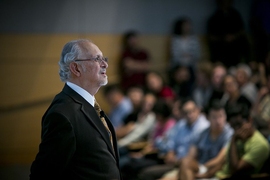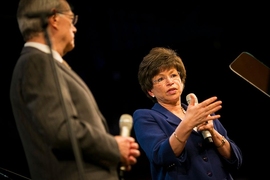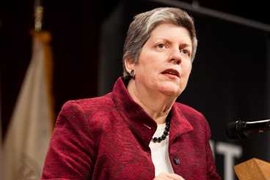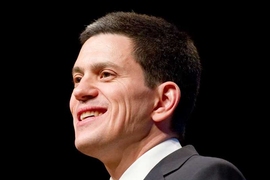World-renowned cellist Yo-Yo Ma made a heartfelt call for ethical action to shape a better society — and played some Bach — while delivering MIT’s annual Karl Taylor Compton Lecture before an engrossed campus audience on Monday.
Every person, Ma said, has an obligation to “find a way, each, according to your strengths and capacities as citizens, to identify and start chipping away at society’s greatest problems.” At the same time, he added, we should ask ourselves a separate but related question: “What can we all do together that we can’t do alone?”
Ma is famous for his mastery of the cello across an impressively large range of musical genres, from the canonical Western classical works to the music of places as disparate as Appalachia and Brazil. That same global outlook has informed his sense of social responsibility: Ma has served as a United Nations Messenger of Peace since 2006.
In his MIT talk, titled, “Culture, Understanding, and Survival,” Ma expressed concern that so many aspects of life seem to be in a state of flux at the moment.
“I’m worried that at the same time we’re making so many advances, while many people’s lives are improving significantly, we are also creating massive disruption,” Ma said.
For all our gains, he said, “we also live in a time of increasing fraction, when the ties that bind us politically, economically, and socially are fraying. I’m concerned that we’re hurtling toward a future … where we can no longer assure the health of our planet, where violence becomes a solution, where intellectual certitude displaces intellectual curiosity, where we feel comfortable turning our back on others.”
And yet, Ma added, “I’m also hopeful, because I believe we can solve those problems with culture’s contribution.”
Speaking without notes to a large audience in MIT’s Kresge Auditorium, Ma defined culture broadly, from “literature to mathematics, from biology to music,” as the result of “our primal drive to understand our environment, ourselves, and others.” By serving as the foundation for a shared understanding of the world, Ma said, “Culture must play a role in our decision making. It turns ‘the other’ into us, and we all have a part to play.”
The magic of music, in the “seat of discovery”
Ma was introduced by MIT President L. Rafael Reif, who noted Ma’s “dazzling list of accomplishments,” which include 18 Grammy Awards and the Presidential Medal of Freedom, bestowed by then-President Obama in 2011.
“He has been teaching us all to sail toward each other on an ocean of culture,” Reif said.
Ma called MIT “one of my favorite places in the world” because of its “sheer energy” and “spirit of inquiry,” and emphasized how much he had enjoyed participating in a luncheon with students held earlier in the day. Ma also noted that he has many colleagues and friends among the composers and performers at MIT.
“I love MIT because it’s the seat of discovery and the very incarnation of invention,” he said.
In his lecture, Ma made the case that two particular modes of thinking help generate productive ideas, which in turn can serve larger social needs. The first is what Ma calls “edge-center oscillation” — the need to connect innovative ideas, which sometimes appear on the margins of a particular discipline, with mainstream thought.
“Culture helps the edges of society communicate with the center of society,” Ma said, emphasizing the need for the “integration of edge ideas into the mainstream.”
In the arts, he noted, we see this in the connections that musicians make across cultures; in science, useful ideas can stay at the margins of a field until researchers open themselves to studying them. As an example, Ma cited the once-unorthodox concept of fighting tumors by cutting off their blood supply, which has become a major area of cancer research.
“If you’re in the center, make sure you’re open to ideas from the edge, and do that all the time,” Ma said.
Ma then played the prelude to the Bach Cello Suite No. 1 — the first piece of music he ever learned — which features “massive disruptive change,” in the form of the lowest notes of the piece, followed by an ending that reaches the piece’s highest notes and repeats its opening motif, which Ma called “a reinvigorated center, a strengthened reflection of the beginning.”
Analysis and empathy
A second mode of thinking, Ma added, involves the integration of our abilities to analyze things and feel empathy for others, something he regards as being vital in almost any field of human endeavor — so that we can be both creative and disciplined, while remaining purposeful in our activities.
“This is a state of mind, a type of thinking, that culture helps us train for,” Ma said.
“Nobody does this better than Bach,” he stated, adding that Bach’s Cello Suite No. 5 “combines total objectivity and total subjectivity, analysis and empathy, the conscious and subconscious. … It’s a compositional miracle.”
To demonstrate, the famed cellist played a part of the piece, explaining that the notes that go down create a “gravitational pull” and “feeling of burden,” while “the notes that go up must struggle against that pull.”
In any aspect of life, Ma suggested, we can experience that same sense of struggle. And while we may not personally cure cancer or solve the world’s problems, he noted, we can always feel we are contributing to a larger cultural effort to make life better for others. In this vein, Ma cited the case of a scientist who once told him, “I view my work as a building block in a very large field.”
Taking the next step together
The Karl Taylor Compton Lecture Series, which dates to 1957, is among MIT's highest-profile lecture events. It is named after the Institute’s 10th president, who held office from 1930 to 1948. Compton also served as chairman of the MIT Corporation from 1948 to 1954.
As Reif stated in his remarks, Compton “made science an equal partner with engineering at MIT,” and, during World War II, helped strengthen MIT’s vital collaborations with the U.S. federal government.
“In the best MIT tradition, President Compton was a citizen scientist,” Reif added. “He was known for the scope of his understanding, his integrity, his creative vision, his inspired service to society, and his charismatic charm.”
Following Ma’s lecture, Reif joined Ma onstage to read aloud audience questions, which Ma answered. The musician then concluded with another call for people to contribute to the common good of society.
“Let us choose the next step in our cultural evolution together,” Ma said, eliciting a standing ovation from the MIT crowd.
